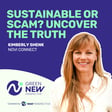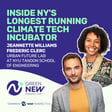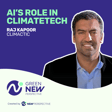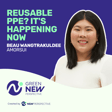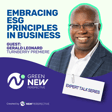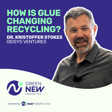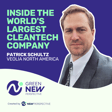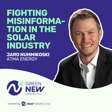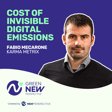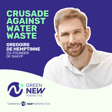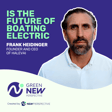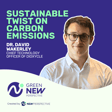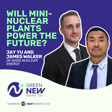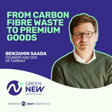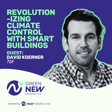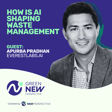
Carbon to Couture: LanzaTech's Carbon Recycling Revolution
Did you know that we can turn pollution and carbon emissions from steel mills into the fabrics of dresses, sneakers, and even perfumes?
Today, we're diving into the groundbreaking world of LanzaTech, a company founded in 2005 when the idea of recycling carbon seemed like science fiction.
Join us as we explore how LanzaTech's mission of carbon recycling is shaping a more sustainable future, one stylish collaboration at a time.
🕑 KEY MOMENTS
==================
- ➜ [01:39] Sarah explains LanzaTech's mission and carbon recycling technology.
- ➜ [03:16] Discussion on LanzaTech's collaborations with big brands like Zara and Gucci.
- ➜ [05:25] Sarah shares the story of LanzaTech's inception and its early challenges.
- ➜ [08:02] Sarah talks about the communication challenges they faced in educating their consumer base.
- ➜ [11:47] Sarah discusses her role as ESG manager at LanzaTech and the progress they've made.
- ➜ [16:24] Sarah explains how they communicate their ESG results to stakeholders, investors, and consumers.
- ➜ [18:07] Discussion on fostering a company culture that aligns with ESG principles.
- ➜ [21:35] Sarah shares her views on the future of sustainability and where she sees LanzaTech fitting into that future.
📚 RESOURCES & LINKS
========================
- Website: https://lanzatech.com/
- LinkedIn: https://www.linkedin.com/company/lanzatech/
- Twitter: https://twitter.com/lanzatech
- YouTube: https://www.youtube.com/user/LanzaTech/videos
👉 Interview with Sarah Ye: https://bit.ly/3Qj5CpA
🌍 SUSTAINABILITY PODCAST CREATED BY NEW PERSPECTIVE
========================
This podcast is proudly sponsored by New Perspective Marketing, a dynamic growth marketing agency in Boston, MA, celebrating 20 years in business. We help sustainably focused B2B organizations grow their brands and scale up revenue. If you or your organization is looking to grow, visit npws.com for more info.
🎧 SUBSCRIBE TO OUR PODCAST
===========================
- Spotify: https://bit.ly/3PSWIyI
- Apple Podcasts: https://bit.ly/3RvlHte
- Youtube: https://bit.ly/3RDzkXg
- Google Podcasts: http://bit.ly/465gjS5
- Deezer: https://bit.ly/3PvQaof
- Amazon Music: https://bit.ly/3PQlijS
- Zencastr: https://bit.ly/48xt75s
💬 FOLLOW US ON SOCIAL MEDIA
============================
- Instagram: https://www.instagram.com/greennewperspective/
- Twitter: https://twitter.com/gnperspective
- Facebook: https://www.facebook.com/greennewperspective
- LinkedIn: https://www.linkedin.com/showcase/greennewperspective/
- TikTok: https://www.tiktok.com/@greennewperspective
- Threads: https://www.threads.net/@greennewperspective
#sustainabilitypodcast #cleanenergy #greennewperspective #sustainability #cleanenergy #podcast #cleantech
